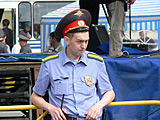Russian Police Reform Still Lacking
By Simon Saradzhyan for ISN
Medvedev signed a decree on the reform of the country’s Interior Ministry on 24 December last year, asking the federal government to prepare proposals within the next several months on how to strip the agency of non-core functions, limit financing its public security unit to federal coffers, raise salaries, downsize personnel by 20 percent and get rid of two departments.
The decree also tasked Interior Minister Rashid Nurgaliev with drafting proposals on how to reorganize the agency, which already numbers 1.4 million (one serviceman per 100 people) and has a budget of over $8 billion.
Specifically, Nurgaliev is to propose how to end overlapping of functions and shift the focus to fighting crime and ensuring public security. He must also develop anti-corruption measures, including the rotation of personnel and the formation of a “scientifically substantiated” system of performance evaluation.
On 2 February, Medvedev attended the annual meeting of the MVD top brass to announce a number of additional steps, including a measure that would criminalize police officers' refusal to obey legitimate orders from their superiors, and sacking for those who publicly criticize the agency or its personnel. It was also announced that the MVD would no longer be in charge of certifying the technical safety of vehicles, which remains a major source of bribe extraction from car owners.
In addition, the Ministry’s central staff will be cut by almost 50 percent, and 17 generals are to be let go, including two deputy ministers - State Secretary Nikolai Ovchinnikov and Arkady Yedelev, supervisor of law-enforcement operations in the volatile North Caucasus. Yedelev's departure is significant and indicates that Medvedev is serious in his push to stabilize the North Caucasus, which has seen a spike in insurgency in the past year.
Also slated for dismantling is a department for law enforcement at so-called special regime facilities and in closed towns (including those housing nuclear weapons personnel). Likewise, the Ministry's transport police is scheduled for reorganization, and its migration service will be branched out and turned into a civilian agency.
No official reason was given for the reshuffles, but Medvedev did refer to “the entire row of incidents.” An unidentified Kremlin official told Gazeta.ru on 2 February that some of the reshuffles were a result of “personnel rotation,” while others were a result of recent corruption and abuse of power scandals.
According to the Interior Ministry’s internal security department (USB), police officers committed 5,000 crimes in 2009, and the overall number of police offenses increased by 17 percent last year.
The agency was also rocked by a number of high-profile scandals last year, including a deadly shooting spree in a supermarket by a drunken Moscow police station chief and a series of videos exposing corruption and abuse of power by police officers. These scandals overshadowed the fact that the number of crimes registered in January-December 2009 was 6.3 percent less than in the same period of 2008.
Poor conduct on the part of police is evidenced by a recent nationwide poll conducted by Russia’s leading independent pollster, Levada Center, in which 67 percent of respondents said they regarded law enforcement agencies with suspicion and apprehension.
Medvedev should be commended for his reforms. Of those measures he has ordered so far, stripping the agency of vehicle safety oversight and ending the financing of the police's public security units from regional budgets to reduce collusion of police and local elites will hopefully help to decrease corruption. But much more needs to be done.
The MVD is clearly is need of a much more robust and pro-active oversight from both the Prosecutor General's office and parliament. Relentless prosecution of top brass corruption will help to deter many in the police rank-and-file. The government would do well to propose measures aimed at thoroughly cleansing the agency's internal security department and making the USB more independent, allowing its personnel to fight police crime in earnest. The government should also review the Interior Ministry's functions and laws that regulate those to remove ambiguities that facilitate corruption and abuse of power.
As importantly, a new system of evaluation and promotion should be put in place. The current system is based on crime and solvency rates, which encourages police to whitewash statistics by refusing to register crimes and boost solvency rates by extracting confessions. Recurrent torture of suspects and such tragically comical incidents as police refusing to investigate finding dismembered body parts, citing lack of evidence that a crime had occurred, have been the results. One alternative could be a system in which evaluation is partially based on solvency of grave crimes and on public opinion polls.
Even with all of these measures, actual implementation would raise doubts, especially given the precedents.
Medvedev has reportedly tasked Sergei Bulavin, plucked out of a senior post in his administration to take over as deputy head of the MVD, with implementing the reforms. But he also chose to keep Nurgaliev - who has been serving in this post for more than six years - as interior minister.
It is unclear whether Bulavin will be given enough power and support to make it all happen.
